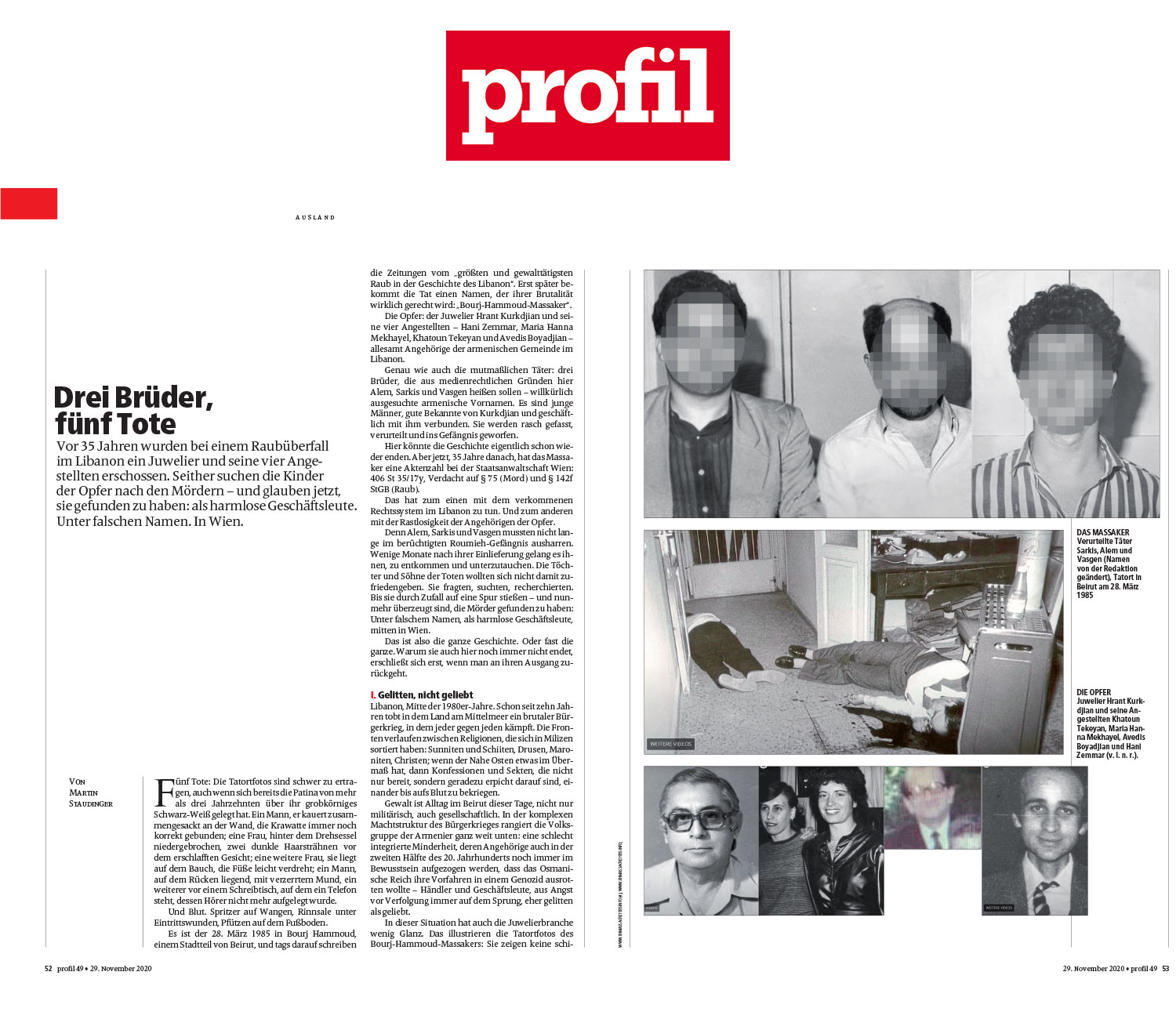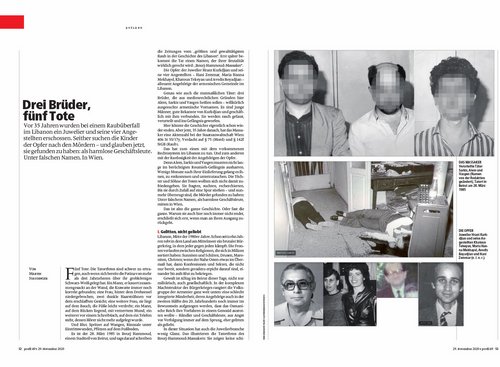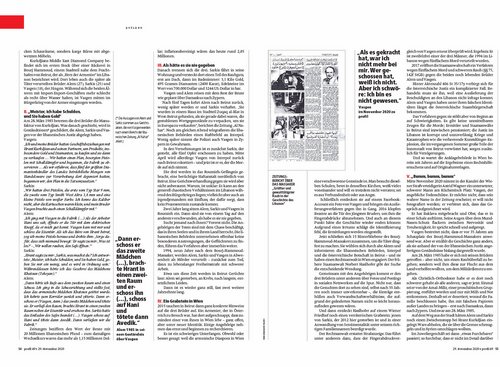Profil magazine, November 2020, by Martin Staudinger
35 years ago, in Lebanon, They robbed a jeweller and his four employees, and shot them all dead. The children of the victims have been looking ever since for the murderers - and now they believe they have found them: as harmless businessmen. Under false names. In Vienna.
The crime scene photos are hard to bear, even if they are old faded black and whites. A man, huddled down against a wall, his tie still neatly done; a woman, fallen behind a swivel chair, two strands of dark hair in front of her lifeless face; another woman, lying on her stomach, feet slightly twisted; a man, lying on his back with a contorted mouth and another in front of a desk with a telephone, whose receiver is off the hook.
And blood. Splashes on their cheeks, streams from entry wounds, puddles on the floor.It is March 28, 1985 in Bourj Hammoud, a district of Beirut, written the next day in the newspapers is news of the "largest and most violent Robbery in the History of Lebanon ”. Later given the name that reflects its brutality: "The Bourj Hammoud massacre".
The victims: the jeweller Hrant Kurkdjian and his four employees - Hani Zemmar, Maria Hanna Mekhayel, Khatoun Tekeyan and Avedis Boyadjian.
The alleged perpetrators: three Brothers for legal reasons we will call them : Alem, Sarkis and Vasgen (arbitrarily selected Armenian first names) They are young Men, they were acquaintances of Kurkdjian with and business connections to him. They were caught quickly ,convicted and thrown in jail.
The story could actually end here.
But now, 35 yearslater, the massacre has a file number at the Vienna Public Prosecutor's Office:406 St 35 / 17y, suspicion of § 75 (murder) and § 142f StGB (robbery).
On one hand, the timing is due to the corrupt legal system in Lebanon. And on the other hand, the new filing is due to the restlessness of the victims' families.
Alem, Sarkis and Vasgen didn't have to stay long in the notorious Roumieh prison.
A few months after settling in, they succeeded in escaping and went into hiding. The daughters and sons of the dead would never be satisfied with this situation. They asked, searched and researched. Until they happened upon a lead -and now they are convinced they have found the murderers: Under a false name, as harmless business people, in the middle of Vienna.
So that's the whole story. Well almost. The reason it doesn't end here is only revealed when you go back to its exit.
I. Suffered, not loved
Lebanon, mid-1980s. Has been raging for ten years a brutal civil war in the Mediterranean country, in which everyone fights against everyone. The fronts run between religions, who have sorted themselves into militias: Sunnis and Shiites, Druze, Maronites, Christians; in the Middle East it has shown that denominations and sects are not just ready, but downright eager to meet each other to fight to the death.
Violence is part of everyday life in Beirut these days, not only militarily, also socially. In the complex power structure of the civil war ranks the ethnic groups the Armenians at the bottom: one badly integrated minority, whose members are also in the second half of the 20th century are still raised and reminded that the Ottoman empire exterminate their ancestors in a deliberate genocide.
- traders and business people, living under the constant fear of persecution, suffered more than loved.
The jewellery industry also faced this dim situation . This is illustrated by the crime scene photos of the Bourj Hammoud massacre: they do not show any showrooms, but rather sparse offices with worn furniture.
Kurkdjian's Middle East Diamond Company is on the first floor above a Bakery in Bourj Hammoud, a district near the cargo port of Beirut, known as the "Heart of the Armenians" in Lebanon. The brothers, who were later convicted as perpetrators, also live there: Alem (27), Sarkis (25) and Vasgen (18).
While the two older men are struggling to survive in an import-export business, Vasgen was drafted into the army in the middle of the civil war.
II. "Master, I have debts, and you have money”.
The three brothers enter Kurkdjian's factory on March 28, 1985, What happens afterwards is described in confessions* that Alem, Sarkis and Vasgen made before the Lebanese judiciary.
(* The statements of Alem and Sarkis come from court records, those from Vasgen are according to a report by the Lebanese Al Nahar Newspaper.)
Vasgen: “Myself and my brothers did business with Hrant Kurkdjian and his partners to buy products, especially gold and diamonds, which we would sell. We had a plan, purchased guns with silencers and started to watch the factory ... When we found out that five of the largest diamond dealers in the country had deposited sizable amounts of merchandise there for processing, we started to put the plan into action."
Sarkis: "We had three pistols, the first was the Star 9 mm type, the second was a Smith West Akra 3.8 mm and one small white pistol. I don't know the caliber , but the cartridges were small, my brother Vasgen also brought a silencer. "
Alem: “I went to the factory with Vasgen (…) the worker Hani saw us, and because he knows me well, he opened the door with the electric button. Vasgen came with me and closed the iron door. When I entered Hrant's office I took out my pistol and threatened him: 'Make sure nobody moves.' He said to me: 'What is it? ‘-, We are robbing you, open the safe.‘ "
Sarkis: "Hrant said to me, 'Sarkis, what are you doing?' 'I replied,' Master, I have debts and you have money, give me a little and it will be okay."Meanwhile I heard the girl screaming, Khatoun (Tekeyan). "
Alem: “Then I heard calls from the second room and one Shot. I went in the direction of the fire and found that the Armenian girl Khatoun was killed. I returned to the corridor trembling.
Then he (Vasgen, note) shot and killed the second girl. He left the room and took Hrant into a second room next to the iron door and shot him. Sarkis had finished unloading the safe (...). Vasgen shot Hani and then killed Avedik. Then we left the factory."
Newspapers counted the value of the booty at 20 million Lebanese pounds - with the exchange rate at that time, this was more than $1.15 million; Adjusted for inflation, that would be around $2.85 Million today.
III. As if they had never existed
Then the three separated. Sarkis drove to his apartment and hid part of the looted property at first on the roof, then in the bathroom: 3.1 kilos of gold, 495 grams of diamonds (2400 carats), precious stones to the Value of $ 700,000 and $ 3,244 in cash.
Vasgen and Alem travel with the rest of the loot as planned, via Damascus to Cyprus.
After five days, Alem returns to Beirut,and a little later he and Sarkis are arrested. "They were found in a house in Zuqaq al-Blat in West Beirut where they were about to pack up the stolen valuables to be sold in Europe ”, reports the newspaper“ Al Nahar ”.
That same evening, the Lebanese authorities wired an arrest warrant to Interpol. A little later, the police also took Vasgen into custody in Cyprus.
In the interrogations, first it is Sarkis who confesses to having shot all five victims. MidApril, however, Vasgen is escorted back to Beirut by Interpol - and now it is he who confesses to carrying out the murders.
The three are taken to Roumieh Prison, a notorious detention centre northeast of Beirut.
A court hearing against them, however not scheduled. Why is unclear: it can be put down to the generally chaotic conditions in Lebanon during the civil war; but may also due to someone with influence, making sure that no trial date comes about.
Alem, Sarkis and Vasgen sit for two years in Roumieh. Then, from one day to the next they disappeared as if they had never existed.
Did anyone look for them? Not until now. The relatives of the dead are busy with the chaos that rules in their souls and in their country. The Lebanese authorities do not seem to be making any special effort to find the fugitives and carry out the legal process.
In 1994, nine years after the Bourj-Hammoud massacre, Alem, Sarkis and Vasgen were sentenced in their absence as murderers -initially to death, then to life imprisonment with hard labour.
Around this time rumors started to spread in Beirut: Alem died of cancer after a long, terrible suffering.
IV. A gravestone in Vienna
In 2015, very specific clues relating to the three brothers appeared in Beirut. An Armenian who was visiting Austria heard that at least one of them was living in Vienna - quite openly, but under a new identity. Some of the relatives took this seriously and began to do some research.
This however was easier said than done: the Armenian diaspora in Vienna is a close knit community. They go to the same schools, pray in the same churches, know a lot about one and other but will reveal very little; be it out of attachment or fear.
Finally, they discover a photo of Vasgen on a Facebook account and initiate extradition proceedings against him. In 2016, Officials knocked at the youngest brother's door to take fingerprints. And at this point the story could have ended again: The identification fails due to an error, the investigation ceases.
Now 15 of the bereaved of the Bourj Hammoud massacre are joining forces to arrest the perpetrators. They rummage through old files and inform the Lebanese authorities, Interpol and the Austrian embassy in Beirut - and they have hired a lawyer in Vienna: the former public prosecutor Norbert Haslhofer gives the search the decisive turn they are looking for.
Together with the relatives he followed the trail to the three brothers, among other things, via photos and postings on social networks. Not only that, even after 35 years, what can be seen there is still unmistakable - the entries reveal relationships that are not easy to find due to the changed names.
The lawyer Haslhofer discovers another tell-tale sign, on a Viennese Cemetery tombstone: that one for Sarkis, who died in 2012 and in an act of sentimentality was buried under his real family name.
The lawyer files a criminal complaint. Leading , among other things, that the Vasgen's fingerprint comparison is checked again. Result: He is undoubtedly one of three men convicted of five murders in Lebanon in 1994.
In 2017 the public prosecutor opened a case for the five murders and aggravated robbery (§§ 75, 142f StGB) against the two still living brothers, Alem and Vasgen.
File number 406 St 35 / 17y is a complicated case for the Austrian judiciary. They will need to run the case because an extradition of the Accused to Lebanon is out of the question.
Alem and Vasgen have long been living under false identities as Austrian citizens.
However, the proceedings against them were fraught with difficulties from the start. There are no immediate witnesses to the murders; Investigators and prosecutors in Beirut are now retired; the judiciary in Lebanon is corrupt and unreliable; wars and disasters like the huge explosion that hit large parts of the city last summer, devastating downtown Beirut, are causing further delays.
And so the prosecution in Vienna has been waiting for the original documents for years,under a mutual legal assistance request.
V. "Boom, boom, boom"
In mid-November 2020, a squat, heavy man sitting at a coffee table: Vasgen, the alleged shooter. He doesn't want his real name to appear in the newspaper; he does not want to be photographed; he forbids that the conversation be recorded.
He brought baklava and fruit piled in a bowl.
His eyes above his face mask are flickering. He speaks quickly and excitedly.
Vasgen does not deny that he was present at the scene of the Bourj Hammoud massacres 35 years ago. But he tells the story in a very different way to the one based on the confessions made to the Lebanese judiciary.
On March 28, 1985, he met with his brothers -but not to commit a robbery; but because they wanted to help him escape from the country in order to avoid military service.
As a Christian Orthodox he said it was harder for him than most people, he said he was once kidnapped by the Amal militia, a pro-Shiite group, and only escaped with great difficulty. That is why he deserted, whereupon his family decided to take him out of the country with false papers - first to Damascus, then to Cyprus. On March 28, 1985.
On the way out of town, Alem and Sarkis would have him stop-over at Hrant Kurkdjian's workshop to pick up goods that they wanted to smuggle across the border to Syria.
Then in the jewellery store "something terrible" happens; so terrible that he didn’t want to talk about it in detail – and he couldn’t because he had memory loss. He heard gunshots and was, in that second, mentally withdrawn: the result of a childhood trauma from the civil war when he was woken in the night by a firefight in front of his house. "When it happened, I was no longer myself", says Vasgen: “I don't know what exactly happened and who shot who. But I swear: it was not me. "
After that, he drove with Alem to Damascus as planned and then flew to Cyprus, where he was later arrested by Interpol and brought back to Beirut. As soon as he arrived at the airport, he was already abused by the police to force a confession “They started to hit me. Boom, boom, boom."
Finally, the family decided that he must take the blame for the act. Why? Because he as Military personnel, and he would not run the risk of the death penalty. And so he confessed. And kept silent. Years. Decades.
VI. A question of belief
Whether this account is credible should actually be clarified in a court hearing. But in all likelihood, at least against Vasgen, there won't be a hearing.
The case against him was suspended at the beginning of November because of the statute of limitations, reports his lawyer, Astrid Wagner. According to Austrian law, criminal prosecution for murder also has an expiry date under certain circumstances - namely if the accused was under 21, i.e. a "young adult", at the time of the crime. Also, if 20 years after the alleged act there is still no trial started against him, and if no other offenses are on record during this time, the perpetrator has nothing to fear. So Vasgen would be safe in Austria.
Against Alem - he tells ‘profil’ through his lawyer that he does not want to comment on the allegations at all - he is still being investigated. In Lebanon, the eldest brother admitted the robbery, but unlike the other two, he never admitted to being involved in the murders.
There remains Sarkis, who originally made the first confession for the murders. But Sarkis is dead.
However, at MA 35, the municipal department for immigration and citizenship in Vienna, proceedings against Alem, Vasgen and some of their relatives are pending. The question is whether they will be expatriated because they have settled in Austria under false identities.
If that happens, a lot is conceivable again: extradition to Lebanon, deportation from Austria, tenacious legal disputes over these measures. And then the story would go on again.



